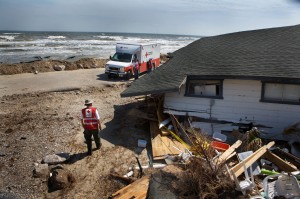Hurricane Safety & Preparedness
Fortunately, Cape Cod does not suffer from annual hurricane damage, but it is a vulnerable area, and we do need to be prepared for the Hurricane Season which continues through November 30. Nor’easters which occur in this region more commonly throughout the year can also cause significant damage from strong winds, heavy rain, and flying debris. Natural disasters are not within our control, however being prepared to keep our family safe is our responsibility.
Every family should develop a Family Action Plan so that if disaster strikes, you are well prepared. Make sure everyone in your family knows what the plan is and where you emergency meeting spot is. Teach young children how and when to dial 911 during an emergency, both with a regular landline phone as well as a cell phone. It is also important to label and familiarize yourself and other responsible family members with the locations of the circuit breaker box, main water shutoff, and any gas line shutoffs. Investigate your home’s vulnerability to storm surge, flooding and wind, and check your insurance coverage. It is also a good idea to take photos or videos of your home’s interior and exterior for insurance purposes, and store them at a friend’s or relative’s house.
Nothing can replace the loss of decades of memories established in a home or efforts invested into building a business so it is smart to protect your property with durable hurricane screens and shutters. Hurricane shutters are affordable, lightweight, and easy to deploy with the push of a button, or you can even have the option to operate them remotely via the internet. Hurricane shutters also provide protection from break-ins and vandalism which makes them ideal for those second homes. Much of the damage from hurricanes can be prevented by storm shutters for the windows and doors.
Falling trees and limbs pose one of the greatest dangers to life and property during a hurricane or Nor’Easter. Homeowners should be sure to take care of tree maintenance prior to the time a hurricane is forecasted. Pruning and removing dead and damaged tree limbs from trees reduces the number of branches which can become projectiles or fall on your house during a wind storm. Damage to homes and power lines can be prevented or reduced by pruning, and the removal of any dead trees. Regularly pruned trees are healthier, more attractive and safer.
Another consideration that will make a disaster such as a hurricane or Nor’Easter more tolerable is a permanently installed generator. While dining by candlelight may be fun, when the power is out for days on end, a self- contained backup system can keep your refrigerator and computer running, and water and heat running. And it is more than just convenience in the winter when the heat is running, your water pipes won’t freeze. Best of all, modern systems power up automatically when the power fails, whether you are at home asleep, or away on vacation.
Be prepared, you can’t prevent the weather, but you can take steps to minimize damage and protect your family.
For further information & safety tips, you can contact the Cape Cod Chapter of the American Red Cross at (508) 775-1540.
If a hurricane is forecast, the Red Cross recommends the following safety steps and tips to prepare for a hurricane:
Assemble a Disaster Supplies Kit
- Gather emergency supplies including: emergency medications, nonperishable foods, a non-electric can opener, bottled water (at least three gallons per day per person), a battery-powered radio, flashlight, extra batteries, extra clothes, important documents, cash and credit cards, a first aid kit and other items for infants, elderly or disabled family members and pets
- Store supplies in a waterproof, easy-to-carry container, such as plastic tub with handles
Prepare a Personal Evacuation Plan
- Identify an evacuation route ahead of time; discuss with family members
- If advised to evacuate, do so immediately
- In case of evacuation to an American Red Cross shelter, be sure to bring the disaster supplies kit, medications, extra clothing, pillows and blankets and other hygiene and comfort supplies
- Make advance preparations for pets so you can bring them with you when you leave, but remember, due to health department regulations, pets aren’t allowed in public shelters
Prepare for High Winds
- Measure windows and obtain shutters or cut plywood to cover each one
- Remove diseased and damaged tree limbs well before a storm strikes
- Strengthen garage doors with vertical support beams made from 2×4’s and “L” brackets
- Get professional help if needed
For further information, you can contact the Cape Cod Chapter of the American Red Cross at (508) 775-1540



